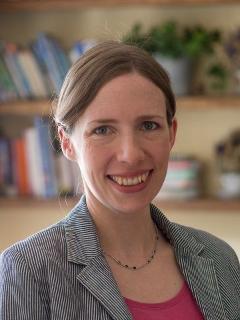Dr Kitty Meeks
Published: 21 August 2019
Algorithms, networks and discrete mathematics

| Dr Kitty Meeks | Kitty.Meeks@glasgow.ac.uk |
| School of Computing Science | |
| Fellowship |
Royal Society of Edinburgh Research Fellowship 2016-2021 EPSRC Fellowship (2021-2026) |
| Area of Research | Algorithms, networks and discrete mathematics |
Why did you choose to pursue a fellowship in your research career?
After completing my PhD at Oxford and a two-year post-doc at Queen Mary University of London, I took a fixed-term position as a lecturer in Maths & Stats at Glasgow. I really enjoyed taking on new teaching responsibilities, but I was also discovering exciting new directions for my own research and was aware that time spent working away from research set me back in relation to those pursuing research-based postdocs. A fellowship allowed me to get back into research full time and explore these new ideas, giving me the chance to establish myself as an independent researcher.
Why work at the University of Glasgow?
I first came to Glasgow primarily because the job was in the right city at the right time: my partner had recently taken up a position as a researcher in the Fraunhofer Centre at the University of Strathclyde. Soon after arriving at the University, though, I realised that it was a place I would like to stay and build my academic career: the most memorable features of the first few weeks were the friendly colleagues and welcoming atmosphere. The decision to hold my fellowship here was very easy! More generally, I’ve found that Scotland is an excellent place to be an early career researcher – there are lots of external opportunities to network and promote your career, and many other institutions close enough for easy collaboration.
How would you describe your research in 20 words or less?
I look for mathematical structure in datasets which can be used to help computers extract useful information more quickly.
What is your research highlight?
This is a tough question and I’m struggling to pick just one: for me, the best thing about the fellowship has been the range of different research directions I’ve been able to pursue. Since starting the fellowship, I’ve worked with colleagues from fourteen different institutions across six countries and expanded my work into several completely new application areas. This range of collaborations opens up all sorts of possibilities for the future, not least a number of different routes to securing research funding in the future.
What do you look for in a collaboration?
For me the best collaborations are when everyone brings something slightly different in terms of experience, resources and understanding. Communication is really important, as well as being realistic with expectations and proposed output. Also, it helps if you are getting along with each other! One of my favourite things about my job is being able to work with people I consider friends in cities across the UK and further afield.
How do you see your research impacting society?
The core part of my research is very abstract so doesn’t have one particular real-world application, but the flip side of this is that the same theory can potentially be applied to a huge range of different problems, even if what I do is usually a few steps removed from the end users. When I started my fellowship, I knew that one application of my work involved the design of optimal interventions to control the spread of a disease through a contact network – particularly in the case of livestock diseases, because really detailed data is recorded about which farm animals come into contact with each other. However, since starting the fellowship I’ve uncovered a whole range of other application areas where my research has something to contribute: these include the role of online networks in social inequality, and the use of biometric data in precision medicine, and from later this year I will be on the supervisory team for interdisciplinary PhD students in both these areas.
What next?
I had a permanent lectureship in Computing Science lined up to start at the end of my fellowship, but holding a fellowship was such a great experience that I didn't want it to end! With just over a year left on my RSE fellowship, this inspired me to start preparing an application for an EPSRC fellowship to follow on. Earlier this year I learnt that this application had been successful, so I now have another five years to focus on research full-time and to take my work in a new direction. The topic of the new fellowship builds on theoretical work I began as a postdoc before coming to Glasgow - about algorithms that count, sample or find all good solutions rather than just one - and also continued as one strand of my first fellowship. I'm particularly excited, though, that over the next few years I will be applying these theoretical ideas to address a range of challenges in precision medicine, making use of large patient datasets to develop more personalised approaches to screening, diagnosis and treatment of several diseases - this is only possible thanks to the collaborations I was able to develop during the first fellowship.
First published: 21 August 2019

